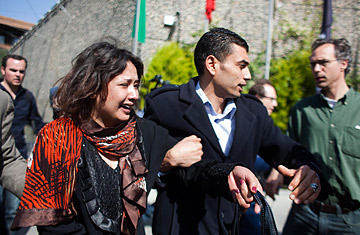
A Ministry of Information official with Iman al-Obeidi in Tripoli on March 15, 2011
The female doctors at one of the larger hospitals here can tell you stories — of corpses of violated women stripped and strewn on the streets of frontline Ajdabiya; of the women afraid to leave their homes in Brega; of the 13-year-old Misratah girl gang-raped by soldiers who burst into the family's living room, forcing her father to watch. "She kept screaming," one doctor says. "Just screaming and screaming, 'Daddy, don't look!' "
The doctors, who are in their mid-20s, are stationed in the emergency room of one of this rebel stronghold's most sophisticated hospitals. They talk for hours about the rape of women. But it's only stories. They have never met a victim.
The medics don't deny that others in the hospital may have treated rape victims. But they say the stigma of sexual assault runs so deep in Libyan culture that the raped are virtually forced into social exile, unable to wed, a humiliation to their entire family, choosing to remain silent rather than to give voice to the crime they have suffered. "We hear these stories all the time. From our friends, from our neighbors," one doctor says. "They are passed along every day. But the women are too scared to come forward themselves." The number of stories whispered in the halls of this hospital has increased exponentially since the start of Libya's civil conflict.
On June 8 in New York City, Luis Moreno-Ocampo, chief prosecutor of the International Criminal Court (ICC), said there were indications that Libyan dictator Muammar Gaddafi had ordered the rape of hundreds of women during his violent crackdown on the rebels and that he had even provided his soldiers with Viagra to stimulate the potential for attacks. The ICC will most likely add rape to the list of war-crime charges already levied against Gaddafi. Rape, Moreno-Ocampo told reporters, is a new weapon for Libya's regime. "We had doubts at the beginning," he said, "but now we are more convinced. Apparently, [he] decided to punish, using rape."
The ICC's announcement was a turning point in the fight to document the incidence of rape in the war-torn North African country. Since the beginning of the uprising against Gaddafi, rumors of its use as military policy have circulated. But journalists and aid organizations have so far struggled to document the alleged phenomenon, relying on secondhand information from doctors who claim to have met and treated patients but do not have patients' permission to reveal their identities. "We never thought we'd see this traumatic rape going on during this war," says Dr. Laila Bugaighis, a women's physician at the Benghazi Medical Center, who says she sees at least one rape victim per day. "It's been a shock, and it's keeping these women afraid. They're trying to hide out and push away anyone [media and rights workers] who's seeking any information." But without victims' testimony, it is impossible to accurately document the true scope of the problem.
